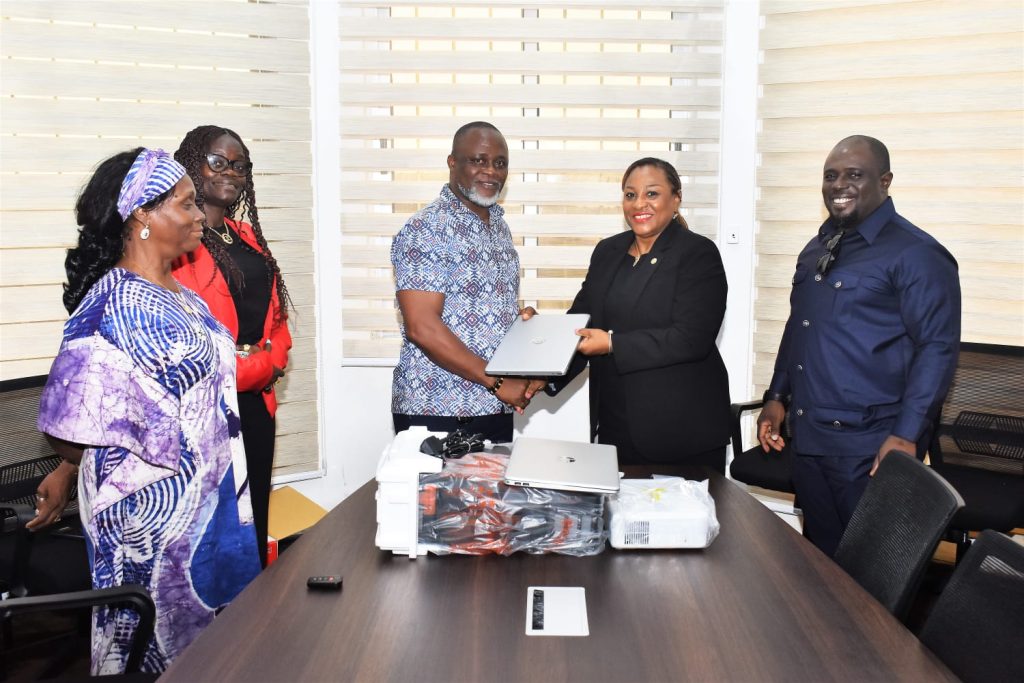The ECOWAS Commission, represented by Ambassador Josephine Nkrumah, recently made a significant contribution to the ECOWAS Protection and Human Security Integrated Coordination Mechanism (ECO-PHSICM) in Liberia. This donation underscores ECOWAS’s dedication to tackling human security issues prevalent in Liberia and the broader ECOWAS region. The donated items, valued at approximately US $2,300, include two HP laptops, a Canon 3410 ink tank printer, and an Epson projector with accessories. These resources aim to enhance the ECO-PHSICM Secretariat’s operational capabilities, crucial for coordinating protection efforts serve vulnerable populations, particularly women, children, displaced individuals, and victims of human trafficking. This initiative builds on commitments made during the In-Country Technical Facilitation Mission in June 2024, where various stakeholders, including the National Center for the Coordination of Response Mechanism (NCCRM), collaborated with ECOWAS to improve human security measures in Liberia.
At a recent handover ceremony for the equipment, Ambassador Nkrumah emphasized the strategic significance of this support, describing it as a key step towards operationalizing the ECO-PHSICM in Liberia. She stated that this initiative will lead to a more coordinated response to the pressing human security issues in the country, asserting ECOWAS’s commitment to partnering with the Liberian government and local stakeholders. Nkrumah highlighted the pressing realities that Liberia faces, including pandemics, natural disasters, and significant migration issues, all of which compound the challenges related to human security. Her remarks aimed to inspire confidence in the coherence and efficiency that the donated equipment would bring to the ongoing protective efforts laid out in Liberia.
Accepting the donation, Mr. Arthur Bestman, the Acting Executive Director of the NCCRM, expressed gratitude towards the ECOWAS team, particularly towards Ambassador Nkrumah, for their steadfast support. Bestman acknowledged the essential role of ECOWAS in building the capacities of the NCCRM, framing the organization as a critical initiative that enables better coordination in Liberia’s multifaceted human security landscape. His appreciation signaled a recognition of the impact such resources could have in addressing pressing human rights violations and strengthened community resilience in Liberia. Furthermore, Bestman appealed to ECOWAS for greater visibility and support for the NCCRM’s initiatives, underlining the importance of public awareness and engagement in driving effective human security measures in the region.
The ECO-PHSICM’s establishment reflects ECOWAS’s broader mission to enhance cooperation among member states in addressing human security challenges through a holistic approach. This framework seeks to fortify national efforts in critical areas such as protecting children, combatting gender-based violence, mitigating the effects of human trafficking, and safeguarding the rights of stateless individuals and displaced populations. Integrating Liberia into this mechanism will forge a collaborative path toward meaningful sectoral changes in governance, policy, and civil society engagement concerning human security. It positions Liberia to systematically address these critical vulnerabilities while benefiting from shared learnings within the ECOWAS community.
Building on pre-existing frameworks ensures that Liberia does not tackle these complex issues in isolation but rather draws on regional knowledge and support that can amplify local efforts. The partnership established through the ECO-PHSICM will not only help facilitate the operational needs of entities like NCCRM but will also foster an environment where various stakeholders can interact, coordinate, and implement effective strategies. This engagement is particularly important as the challenges related to human security are often interconnected, necessitating concerted efforts and collaborative governance structures that can respond to emerging threats and persistent vulnerabilities.
In conclusion, the donation made by the ECOWAS Commission symbolizes a proactive approach to strengthening Liberia’s human security infrastructure and deepens ECOWAS’s commitment to enhancing the welfare of vulnerable populations. As Liberia embarks on this collaborative journey alongside ECOWAS, the hope remains that the integration of the ECO-PHSICM will cultivate resilience and foster an environment that prioritizes human rights and security. The combined efforts of key stakeholders will be crucial in harnessing the potential of these resources, advocating for the rights of those necessitating protection, and ensuring a sustainable and equitable future for all citizens of Liberia.


